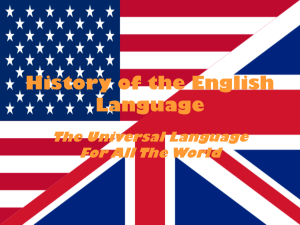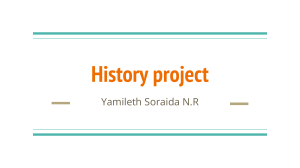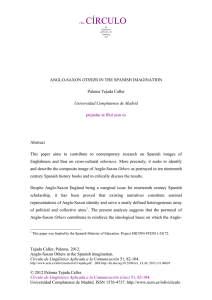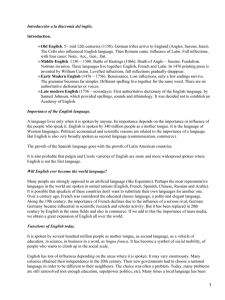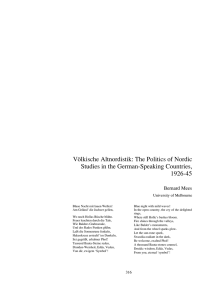Historia de la lengua inglesa Periods in History of English The Celts/Pre-Roman
Anuncio
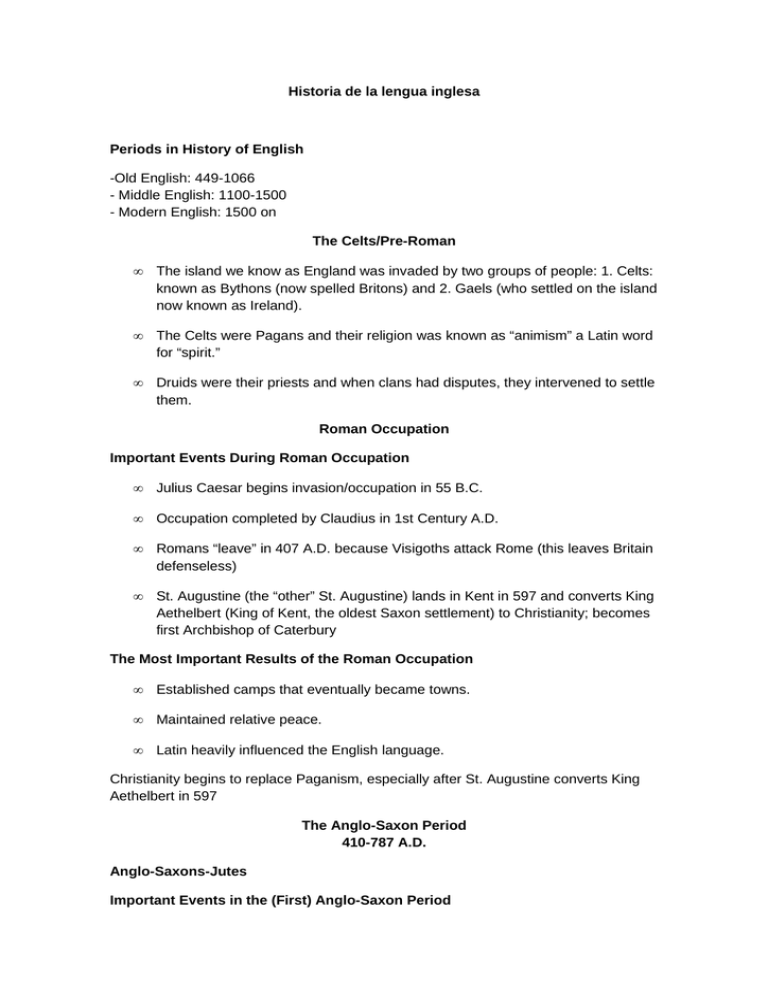
Historia de la lengua inglesa Periods in History of English -Old English: 449-1066 - Middle English: 1100-1500 - Modern English: 1500 on The Celts/Pre-Roman • The island we know as England was invaded by two groups of people: 1. Celts: known as Bythons (now spelled Britons) and 2. Gaels (who settled on the island now known as Ireland). • The Celts were Pagans and their religion was known as “animism” a Latin word for “spirit.” • Druids were their priests and when clans had disputes, they intervened to settle them. Roman Occupation Important Events During Roman Occupation • Julius Caesar begins invasion/occupation in 55 B.C. • Occupation completed by Claudius in 1st Century A.D. • Romans “leave” in 407 A.D. because Visigoths attack Rome (this leaves Britain defenseless) • St. Augustine (the “other” St. Augustine) lands in Kent in 597 and converts King Aethelbert (King of Kent, the oldest Saxon settlement) to Christianity; becomes first Archbishop of Caterbury The Most Important Results of the Roman Occupation • Established camps that eventually became towns. • Maintained relative peace. • Latin heavily influenced the English language. Christianity begins to replace Paganism, especially after St. Augustine converts King Aethelbert in 597 The Anglo-Saxon Period 410-787 A.D. Anglo-Saxons-Jutes Important Events in the (First) Anglo-Saxon Period • 410-450 Angles and Saxons invade from Baltic shores of Germany, and Jutes invade from Jutland peninsula in Denmark, thus driving out the Celts. • Nine Anglo-Saxon Kingdoms eventually become the Anglo-Saxon heptarchy (England not unified) or “Seven Sovereign Kingdoms”. • King Alfred “the Great” managed peace against the Danes for about a generation, until William of Normandy defeated them in 1066. Anglo-Saxon Literature • Germanic ethos that celebrated the warrior and his exploits. • Most storytelling was oral. • Old English Poetry became distinctive... 1. Alliteration- repetition of consonant sounds 2. Kenning- a metaphor expressed as a compound noun - “whale-path” for the seaCaesura- a break or pause in poetry (Buscar ejemplos en Beowulf). 3. Caesura- a break or pause in poetry Viking Invasion • The Vikings were sea-faring, explorers, traders and warriors, Scandinavians during the 8th-11th centuries. • Expeditions that plundered and ended in conquest and settlements of Britain. • King Alfred “the Great” in 871 was able to use the language to appeal the English and his efforts saved the language. Importance of the Viking Invasions • Politically and Culturally- there was no central government or church* BUT The Anglo-Saxon Code is evident in Beowulf. • Linguistically • Old English is born- mainly Germanic (although even Germanic languages are derived from a theoretical Proto-Indo-European language, the grandparent of classical languages such as Greek, Sanskrit, Latin and German). • LOTS of dialects of Old English- because there are several separate Kingdoms, many founded by essentially five or six different cultures: Anlges, Saxons, Frisians, Jutes, Danes and Swedes. • *King Alfred “the Great” (ruled approx. 871-899 A.D.) was one of the first Anglo-Saxon kings to push Vikings back; in fact, he was one of the first kings consolidating power, unifying Anglo-Saxon kingdoms. Norman Invasion • In 1066 at the Battle of Hastings, the Normans (powerful Northern Frenchmen) defeat the English and start a century-long conquest of England. • William (Duke of Normandy) crowns himself the ruler of England (1066) and establishes a social system: Feudalism- a hierarchy of rulers under one lord; individuals gave military and other services to their overlords in return for protection and land. • Cultural/Political/Literature Influence: • French becomes official language of politics and power and exerts enormous influence on Old English, which becomes obsolete. • William maintains efficient system of government of Anglo-Saxons, but replaces the English nobility with Normans, and creates a great class division that oppressed the Anglo-Saxons. • Celts (Brythons and Gaels) • Roman Conquest • Anglo-Saxon Period • Viking Invasions • Noman Conquest begins in up to 55 B.C. 55 B.C. - 407 A.D. 407 A.D. - 787 A.D. 787 A.D. - 1066 A.D. 1066 A.D. Introduction The history of the English language really started with the arrival of three Germanic tribes who invaded Britain during the 5th century AD. These tribes, the Angles, the Saxons and the Jutes, crossed the North Sea from what today is Denmark and northern Germany. At that time the inhabitants of Britain spoke a Celtic language. But most of the Celtic speakers were pushed west and north by the invaders - mainly into what is now Wales, Scotland and Ireland. The Angles came from Englaland and their language was called Englisc - from which the words England and English are derived. 1. OLD ENGLISH • • Descendant of the German language Spoken by Angles and Saxons HISTORY • 5th Century AD: Angles and Saxons (Germanic tribes) invaded the Britain • Reunited, became Anglo-Saxons • Their language is Englisc, which was where the word English originated • Circa 890 AD: Anglo-Saxons invaded a land • Called it Anglo-Land (now called England), meaning Land of the Angles MIGRATION • Irish missionaries came to England • Brought the Latin alphabet ROMAN INVASION • 597 AD: Roman invader Augustine attempted to Christianize England • Established kingdoms all over England RESULTS • The Latin alphabet became the basis of English alphabet • Romans spread and popularized English throughout England CHANGES IN OLD ENGLISH • æ • Pronounced as ai • Changed to e • Example: næver is now spelled never • Feminine/Masculine word form dropped • Indefinite articles, a and an were introduced • Verb placement • 755 AD: verb is placed at the end of a sentence • ¶at he… na justise ne dide • Translation: that he no justice did (Nielsen 203) • 1137: verb is placed after the pronoun • til hi iafen up here castles • Translation: till they surrendered their castles (Nielsen 203) The invading Germanic tribes spoke similar languages, which in Britain developed into what we now call Old English. Old English did not sound or look like English today. Native English speakers now would have great difficulty understanding Old English. Nevertheless, about half of the most commonly used words in Modern English have Old English roots. The words be, strong and water, for example, derive from Old English. Old English was spoken until around 1100. The first people in england whose language we have definite knowledge are the Celts. Celtic was probably the first Indo-European tongue to be spoken in England. Latin was spoken for a period of about four centuries before the coming of English. The Romans in Britain. 2. MIDDLE ENGLISH HISTORY • The Normans, who spoke French, invaded England • Royalties and government officials began speaking French • English became language of the poor (peasants, butchers, maids, servants) • Also the language of poets and writers • English kings began marrying Norman women • More people adapted French language, causing the decline of English usage. RESULTS • English children became bilingual • Materials written in English became very scarce • Many French words were borrowed • tax, estate, trouble, duty, pay, table, boil, serve, roast, dine, religion, savior, pray, and trinity • French was England’s official language up until the beginning of 14th century CHANGES • Three different words with one meaning • kingly (Old English), royal (French), and regal (Latin). meaning of “relating to a king” • More French Influence • More borrowed words • Borrowed words, cellar and place affected the way c was pronounced • Cene, cyssan, and cneow (Old English) • Lice and mice In 1066 William the Conqueror, the Duke of Normandy (part of modern France), invaded and conquered England. The new conquerors (called the Normans) brought with them a kind of French, which became the language of the Royal Court, and the ruling and business classes. For a period there was a kind of linguistic class division, where the lower classes spoke English and the upper classes spoke French. In the 14th century English became dominant in Britain again, but with many French words added. This language is called Middle English. It was the language of the great poet Chaucer (c1340-1400), but it would still be difficult for native English speakers to understand today 3. MODERN ENGLISH Great Vowel Shift a. Happened between 1400 and 1500 b. Sudden and major change how vowels are pronounced i. a is pronounced as /ei/ ii. e as /ei/ and/or /i/ iii. i as /ai/ iv. o as /ou/or /u/ v. and u as /au/ CHANGES AND DIFFICULTIES • Many English words are not pronounced as they used to be • A person born in 1400 would have difficulty understanding a person from the 1500s • Very careful listening and analysis of written documents were done for better understanding • Example: House and mouse used to rhyme with moose OTHER FACTORS THAT CHANGED EARLY MODERN ENGLISH William Shakespeare • Began writing his sonnets and novels • Created words, such as critical, leapfrog, majestic, pedant, and dwindle • Created clichés, such as flesh and blood, and vanish into thin air William Caxton • Introduced the printing press to England in 1476 • Began printing English textbooks • Were sold at cheap prices • English grammar, spelling, and vocabulary were standardized • 1604: dictionary was published Late Modern English • Began in the 1800s and is the English that we speak today • Same as Early Modern English, but has richer vocabulary BRITISH EMPIRE • Colonized many nations • Words were borrowed (i.e. pajamas and shampoo from Hindi, tycoon from Japanese, and sauna from Finnish) and added to the English vocabulary • Other words have Latin or Greek roots (i.e. biology, oxygen) World War I and World War II • • American soldiers collaborated with British soldiers • Military slang words were created • blockbuster, nosedive, camouflage, radar, roadblock, spearhead, and landing strip Early Modern English (1500-1800) Towards the end of Middle English, a sudden and distinct change in pronunciation (the Great Vowel Shift) started, with vowels being pronounced shorter and shorter. From the 16th century the British had contact with many peoples from around the world. This, and the Renaissance of Classical learning, meant that many new words and phrases entered the language. The invention of printing also meant that there was now a common language in print. Books became cheaper and more people learned to read. Printing also brought standardization to English. Spelling and grammar became fixed, and the dialect of London, where most publishing houses were, became the standard. In 1604 the first English dictionary was published. • Late Modern English (1800-Present) The main difference between Early Modern English and Late Modern English is vocabulary. Late Modern English has many more words, arising from two principal factors: * firstly, the Industrial Revolution and technology created a need for new words; * secondly, the British Empire at its height covered one quarter of the earth's surface, and the English language adopted foreign words from many countries.
